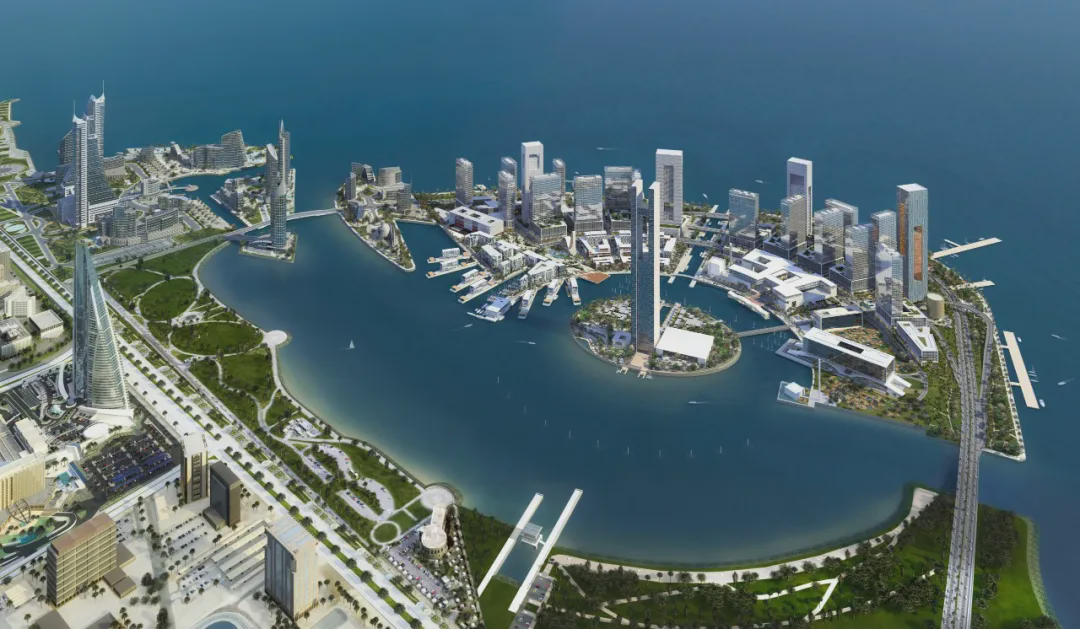
Under Bahrain's sunny skyline, data is transmitted through a carefully calibrated blockchain network, transforming everyday tasks into smooth experiences. Traffic lights adjust in real-time, guided by sensors that understand the city's rhythm, while utility usage is recorded on an unbreakable digital ledger, with water and electricity bills settled automatically. In a city that operates like a precision machine, bureaucracy gives way to speed, security, and trust.
This is a bold step for Bahrain into the future - a blockchain-driven smart city that not only functions properly but thrives. Under the watchful eyes of the world, this pioneering project is likely to rewrite the blueprint for cities worldwide, blending technology and humanity seamlessly.
At the heart of Bahrain's smart city initiative is the 'digital-first' principle, with blockchain playing a key role in the digitization of urban systems and services.
'Bahrain is a model for transitioning from an oil-reliant economy to investing in a knowledge economy.' Dominic Williams, founder and chief scientist of DFINITY, a major contributor to internet computer blockchain, stated, 'Smart cities will increasingly use artificial intelligence algorithms to improve the efficiency of various services, from road and infrastructure management to enhanced healthcare services.'
The unique features of blockchain are particularly well-suited for smart city applications, as its decentralized nature allows for smooth and secure data exchanges, which are crucial for the efficient operation of smart city infrastructure.

Don Tapscott, co-founder and executive chairman of the Blockchain Research Institute, stated, 'Blockchain-based smart city projects like those in Bahrain demonstrate how cities can leverage blockchain to solve complex problems and drive the next wave of urban innovation.'
In his book (Blockchain Revolution), Tapscott discusses how blockchain can help visionary leaders achieve better public outcomes. 'Blockchain can drive improvements in infrastructure management, energy, waste and water management, environmental monitoring, emergency services, education, and public health,' he stated. 'By streamlining processes and enhancing municipal service delivery, blockchain can also support the development of low-carbon infrastructure - a critical need for cities worldwide.'
It is no surprise that as urban planners and governments double down on the potential of technology to change urban life, blockchain cities are emerging around the globe.
From Dubai to Seoul, major cities are actively exploring blockchain technology to streamline various aspects, from real estate to public transportation, as blockchain can manage the complex data exchanges required for smart cities in a fast and cost-effective manner.
Blockchain expert Yousef Janahi stated, 'Blockchain can streamline processes such as real estate registration, utility management, and other public services by providing transparent and tamper-proof transaction records.' Besides Dubai, cities like Seoul and Moscow are also taking initiatives, with Seoul launching blockchain-based ID cards and starting its own city-wide blockchain integration strategy, while 'Moscow has transformed its voting and public service systems using blockchain technology, enhancing transparency and trust,' Janahi observed.
In a world where cyber threats are increasingly complex, protecting the foundational data and systems of smart cities is critical. The decentralized nature of blockchain makes it more secure than vulnerable traditional centralized systems.
'Running artificial intelligence models on the blockchain in the form of smart contracts gives them tamper-proof capabilities, preventing cyber attacks even without cybersecurity measures.' Williams explained that smart contracts have these properties because they reside on the network, which is created by mathematically secure network protocols that have 'Byzantine fault tolerance' characteristics.
This stands in stark contrast to traditional centralized IT, which typically runs on cloud services and must be protected by vulnerable cybersecurity systems, potentially making it unreliable. 'In our dialogues with policymakers around the world, we know that governments are aware of these risks and are looking to leverage blockchain technology to enhance national security and achieve greater economic advancement,' Williams shared.

However, according to Tapscott, the scale of blockchain required for implementing smart cities faces some challenges, some of which relate to the ambitious nature of such projects. 'In many smart city projects, there is a tendency to prioritize technology over human factors, leading to concerns about privacy and data security,' he explained.
Tapscott observed that the concept of 'ultimate openness' in some smart cities raises concerns about ongoing surveillance, which could undermine public trust. 'Bahrain needs to address these issues head-on, ensuring that its blockchain system is transparent, secure, and respects citizens' privacy.' He stated, 'The challenge is to avoid the pitfalls of building from scratch that have plagued other smart city projects.'
He asserted that many smart city initiatives attempted over the past two decades have ultimately turned into ghost towns because they did not integrate with existing business routes or lacked the economic and social ecosystems necessary for prosperity. He said, 'Bahrain can learn from these examples to ensure that its blockchain-based smart city is not an isolated experiment but closely connected with existing urban and economic infrastructures.'
The World Economic Forum is also advocating for a blockchain-driven future, focusing on making urban systems, such as mobility services, real estate, and energy grids, more interconnected and secure. 'The broader global trend is that cities are increasingly recognizing the value of blockchain in creating more sustainable, efficient, and responsive urban environments,' Tapscott noted. 'As more cities follow Bahrain's lead, we can see a global shift in the way urban infrastructure is conceived and managed.'
Looking ahead, the ability to integrate blockchain with other emerging technologies such as artificial intelligence, the Internet of Things, and spatial user experiences could be key to this transformation, enabling more responsive, adaptive, and intelligent cities.
'The creation of regulatory sandboxes - where new technologies can be tested and explored in a risk-free environment - is also crucial to support this transformation, allowing cities to experiment with blockchain without being constrained by traditional regulatory frameworks.' Tapscott explained, 'As blockchain technology matures and further integrates with urban systems, it could fundamentally reshape how cities operate, how services are delivered, and how citizens interact with their environment.'

The IC content you care about
Technological Advances | Project Information | Global Activities

Collect and follow the IC Binance channel
Stay updated
